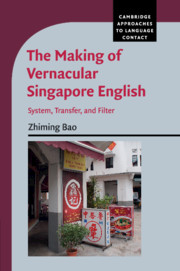25 results
Electron Microscopy of Perokskite Phase Distribution on Light Emitting Edges
-
- Journal:
- Microscopy and Microanalysis / Volume 26 / Issue S2 / August 2020
- Published online by Cambridge University Press:
- 30 July 2020, pp. 2346-2347
- Print publication:
- August 2020
-
- Article
-
- You have access
- Export citation
TEM Characterization of the Edges of CsPb2Br5 Perovskite Crystals
-
- Journal:
- Microscopy and Microanalysis / Volume 24 / Issue S1 / August 2018
- Published online by Cambridge University Press:
- 01 August 2018, pp. 1984-1985
- Print publication:
- August 2018
-
- Article
-
- You have access
- Export citation
Copyright page
-
- Book:
- The Making of Vernacular Singapore English
- Published online:
- 05 November 2015
- Print publication:
- 14 August 2015, pp iv-iv
-
- Chapter
- Export citation
5 - Substratum, lexifier, and typological universals
-
- Book:
- The Making of Vernacular Singapore English
- Published online:
- 05 November 2015
- Print publication:
- 14 August 2015, pp 102-129
-
- Chapter
- Export citation
3 - Grammatical system and substratum transfer
-
- Book:
- The Making of Vernacular Singapore English
- Published online:
- 05 November 2015
- Print publication:
- 14 August 2015, pp 37-66
-
- Chapter
- Export citation
7 - Convergence-to-substratum
-
- Book:
- The Making of Vernacular Singapore English
- Published online:
- 05 November 2015
- Print publication:
- 14 August 2015, pp 163-186
-
- Chapter
- Export citation
2 - The ecology of Singapore English
-
- Book:
- The Making of Vernacular Singapore English
- Published online:
- 05 November 2015
- Print publication:
- 14 August 2015, pp 15-36
-
- Chapter
- Export citation
References
-
- Book:
- The Making of Vernacular Singapore English
- Published online:
- 05 November 2015
- Print publication:
- 14 August 2015, pp 194-210
-
- Chapter
- Export citation
Glossary
-
- Book:
- The Making of Vernacular Singapore English
- Published online:
- 05 November 2015
- Print publication:
- 14 August 2015, pp xv-xvi
-
- Chapter
- Export citation
6 - Frequency, usage, and the circumscriptive role of the lexifier
-
- Book:
- The Making of Vernacular Singapore English
- Published online:
- 05 November 2015
- Print publication:
- 14 August 2015, pp 130-162
-
- Chapter
- Export citation
8 - Epilogue
-
- Book:
- The Making of Vernacular Singapore English
- Published online:
- 05 November 2015
- Print publication:
- 14 August 2015, pp 187-193
-
- Chapter
- Export citation
Acknowledgements
-
- Book:
- The Making of Vernacular Singapore English
- Published online:
- 05 November 2015
- Print publication:
- 14 August 2015, pp xiii-xiv
-
- Chapter
- Export citation
Contents
-
- Book:
- The Making of Vernacular Singapore English
- Published online:
- 05 November 2015
- Print publication:
- 14 August 2015, pp v-vii
-
- Chapter
- Export citation

The Making of Vernacular Singapore English
- System, Transfer, and Filter
-
- Published online:
- 05 November 2015
- Print publication:
- 14 August 2015
Tables
-
- Book:
- The Making of Vernacular Singapore English
- Published online:
- 05 November 2015
- Print publication:
- 14 August 2015, pp viii-x
-
- Chapter
- Export citation
Series editor’s foreword
-
- Book:
- The Making of Vernacular Singapore English
- Published online:
- 05 November 2015
- Print publication:
- 14 August 2015, pp xi-xii
-
- Chapter
- Export citation
Index
-
- Book:
- The Making of Vernacular Singapore English
- Published online:
- 05 November 2015
- Print publication:
- 14 August 2015, pp 211-214
-
- Chapter
- Export citation
1 - Introduction
-
- Book:
- The Making of Vernacular Singapore English
- Published online:
- 05 November 2015
- Print publication:
- 14 August 2015, pp 1-14
-
- Chapter
- Export citation
4 - Topic prominence, empty categories, and the bare conditional
-
- Book:
- The Making of Vernacular Singapore English
- Published online:
- 05 November 2015
- Print publication:
- 14 August 2015, pp 67-101
-
- Chapter
- Export citation
Substratum transfer targets grammatical system
-
- Journal:
- Journal of Linguistics / Volume 48 / Issue 2 / July 2012
- Published online by Cambridge University Press:
- 17 April 2012, pp. 479-482
- Print publication:
- July 2012
-
- Article
- Export citation



